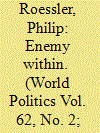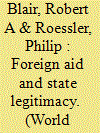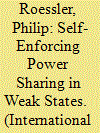|
|
|
Sort Order |
|
|
|
Items / Page
|
|
|
|
|
|
|
| Srl | Item |
| 1 |
ID:
103866


|
|
|
|
|
| Publication |
2011.
|
| Summary/Abstract |
Why do rulers employ ethnic exclusion at the risk of civil war? Focusing on the region of sub-Saharan Africa, the author attributes this costly strategy to the commitment problem that arises in personalist regimes between elites who hold joint control of the state's coercive apparatus. As no faction can be sure that others will not exploit their violent capabilities to usurp power, elites maneuver to protect their privileged position and safeguard against others' first-strike capabilities. Reciprocal maneuvering, however, reinforces suspicion and increases intrigue within the regime, undermining trust and often triggering a security dilemma. In the face of a rising internal threat, rulers move to eliminate their rivals to guarantee their personal and political survival. But the cost of such a strategy, especially when carried out along ethnic lines, is that it increases the risk of a future civil war. To test this argument, the author employs the Ethnic Power Relations data set combined with original data on the ethnicity of conspirators of coups and rebellions in Africa. He finds that in Africa ethnic exclusion substitutes civil war risk for coup risk. And rulers are significantly more likely to exclude their coconspirators-the very friends and allies who helped them come to power-than other included groups, but at the cost of increasing the risk of a future civil war with their former allies. In the first three years after being purged from the central government, coconspirators and their coethnics are sixteen times more likely to rebel than when they were represented at the apex of the regime.
|
|
|
|
|
|
|
|
|
|
|
|
|
|
|
|
| 2 |
ID:
178726


|
|
|
|
|
| Summary/Abstract |
What are the effects of foreign aid on the perceived legitimacy of recipient states? Different donors adhere to different rules, principles, and operating procedures. The authors theorize that variation in these aid regimes may generate variation in the effects of aid on state legitimacy. To test their theory, they compare aid from the United States to aid from China, its most prominent geopolitical rival. Their research design combines within-country analysis of original surveys, survey experiments, and behavioral games in Liberia with cross-country analysis of existing administrative and Afrobarometer data from six African countries. They exploit multiple proxies for state legitimacy, but focus in particular on tax compliance and morale. Contrary to expectations, the authors find little evidence to suggest that exposure to aid diminishes the legitimacy of African states. If anything, the opposite appears to be true. Their results are consistent across multiple settings, multiple levels of analysis, and multiple measurement and identification strategies, and are unlikely to be artifacts of sample selection, statistical power, or the strength or weakness of particular experimental treatments. The authors conclude that the effects of aid on state legitimacy at the microlevel are largely benign.
|
|
|
|
|
|
|
|
|
|
|
|
|
|
|
|
| 3 |
ID:
160340


|
|
|
|
|
| Summary/Abstract |
Power sharing, in which elites from rival societal groups agree to share control of the central government, is a key source of domestic peace, enabling states to escape devastating cycles of exclusion and civil war. Yet the conditions giving rise to inclusive governance are not well understood. In contrast to existing scholarship that emphasizes the importance of external third-party mediation or strong formal institutions, we point to the structural roots of power sharing in which political inclusion stems from the distribution of societal power and the balance of threat capabilities it produces. Only when both the ruling group and a given rival group possess strong mobilizational capabilities, such that each could credibly threaten to recapture state power if excluded from the central government, does self-enforcing power sharing emerge. A strong rival induces the ruler to commit to power sharing and to reluctantly accept coup risk over civil war risk. The ruling group's own threat capabilities, in turn, constrain rivals from trying to convert their share of power into absolute power. Supported by extensive quantitative and qualitative evidence with particular reference to weak states in sub-Saharan Africa, we shed light on the conditions under which the distribution of violence within a state underwrites a peaceful and productive equilibrium. In doing so, we rethink how scholars approach the study of civil war. Rather than conceiving of it in terms of effective resistance, we model civil war as a contest for state power shaped by groups’ capabilities to project force in the capital.
|
|
|
|
|
|
|
|
|
|
|
|
|
|
|
|
|
|
|
|
|